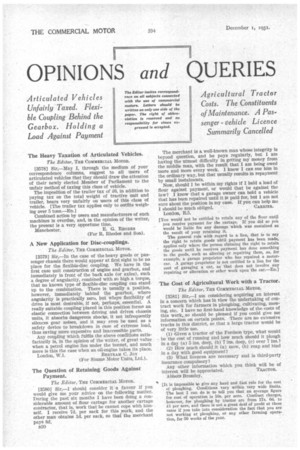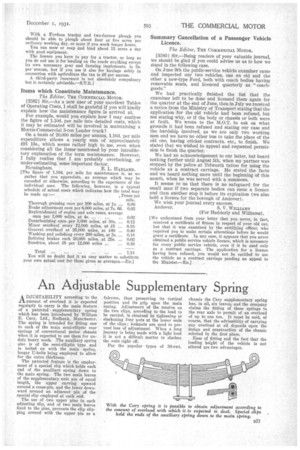OPINIONS and QUERIES The Heavy Taxation of Articulated Vehicles.
Page 54

Page 55

If you've noticed an error in this article please click here to report it so we can fix it.
The Editor, THE COMMERCIAL MOTOR.
135781 Sir,—May I, through the medium of your correspondence columns, suggest to all users of articulated vehicles that they should draw the attention of their newly elected Member of Parliament to the unfair method of taxing this class of vehicle.
The imposition of the trailer tax of £6, in addition to Paying tax on the total weight of tractive unit and trailer, bears very unfairly on users of this class of vehicle, [The trailer tax applies only to outfits weighing over 5 tons.—E.1 • Combined action by users and manufacturers of such machines is overdue, and, in the opinion of the writer, the present is a very opportune time.
Manchester. E. G. RHODES (For R. Rhodes and Son).
A New Application for Disc-couplings.
The Editor, THE COMMERCIAL MOTOR.
[3579] Sir,—In the case of the heavy goods or passenger chassis there would appear at first sight to be no place for the flexible-disc coupling. We have in the first case unit construction of engine and gearbox, and immediately in front of the back axle (or axles), such a degree of angularity, combined with so high a torque, that no known type of flexible-disc coupling can stand up to the combination. There is usually a position, however, immediately behind the gearbox, where angularity is practically zero, but where flexibility of drive is most desirable, if not, perhaps, essential. A really suitable coupling placed in this position forms an elastic connection between driving and driven chassis units, it absorbs dangerous shocks, it not infrequently silences gear noises, and it may even be used as a safety device to breakdown in ease of extreme load, thus saving more expensive and inaccessible parts.
Any coupling which fulfils the above conditions satisfactorily is, in the opinion of the writer, of great value when a petrol engine lies under the bonnet, and much more is this the case when an oil-engine takes its place.
London, W.1. BERTRAM C. JOY (For Shims Motor Units, Ltd.).
The Question of Retaining Goods Against Payment.
The Editor, THE COMMERCIAL MOTOR.
[3580] Sir,—I should consider it a favour if you would give me your advice on the following matter. During the past six months I have been doing a considerable amount of flour cartage for another cartage contractor, that is, work that he cannot cope with himself. I receive 7d. per sack for this ;work, and the other man obtains 1d. per sack, so that the merchant pays 8d.
B20 The merchant is a well-known man whose integrity is beyond question, and he pays regularly, but I am having the utmost difficulty in getting my money from the middle man, with the result that I am being owed more and more every week. I know I can sue him in the ordinary way, but that usually results in repayment by small instalments. Now, should I be within my rights if I held a load of flour against payment, or would that be against the law? I know that a garage owner can hold a vehicle that has been repaired until it is paid for, but I am not sure about the position in my case. If you can help me
I should be much obliged. CARRIER. London, E.5.
[You would not be entitled to retain any of the flour until you receive payment for the cartage. If you did so you would be liable for any damage which was sustained as the result of your retaining it.
The general rule with regard to a lien' that is to say the right to retain goods until payment has been made, applies only where the person claiming the right to retain the goods until he receives payment has done something to the goods, such as altering or repairing them, as, for example, a garage proprietor who has repaired a motorcar. A garage proprietor is not entitled to a lien for the cost of garaging a ear, as that does not involve any repairing or alteration or other work upon the car.—ED.] The Cost of Agricultural Work with a Tractor.
The Editor, THE COMMERCIAL MOTOR.
[3581] Sir,—I am considering acquiring an interest in a concern which has in view the undertaking of contract work for farmers in ploughing, cultivating, mowing, etc. I have no first-hand knowledge of the costs of this work„so should be pleased if you could give me information on certain points. There are no extensive tracks in this district, so that a large tractor would be of very little use.
(1) Given a tractor of the Fordson type, what would be the cost of running and how much should it plough in a day (a) 5 ins. deep, (b) 7 ins. deep, (c) over 7 ins.?
(2) How much should it (a) mow, (b) reap and hind in a day with good equipment?
(3) What licences are necessary and is third-party insurance compulsory? Any other information which you think will be of
interest will be appreciated. TRACTOR. Abbots Bromley.
[It is impossible to give any hard and fast rule for the cost of ploughing. Conditions vary within very wide limits. The best I can do is to tell you that an average figure for cost of operation is 10s. per acre. Contract charges, however, for ploughing by tractor are from 17s. 6d. to l per acre, and there is not a great deal of profit at these rates if you take into consideration the fact that you are not working at ploughing, or any other farming operation, for 50 weeks of the year. With a Fordson tractor and two-furrow plough you should be able to plough about four or five acres per ordinary working day, or more if you work longer hours.
You can mow or reap and bind about 15 acres a day with good equipment.
The licence you have to pay for a tractor, so long as you do not use it for hauling on the roads anything except its own necessary gear and farming implements, is 5s. per annum, but if you use it also for haulage solely in connection with agriculture the tax is 16 per annum.
A third-party insurance is not absolutely compulsory but is eertainly advisable.—S.T.R.1
Items which Constitute Maintenance.
The Editor, THE COMMERCIAL MOTOR.
[3582] Sir,—As a new user of your excellent Tables of Operating Costs, I shall be grateful if you will kindly explain how the maintenance figure is arrived at.
For example, would you explain how I may analyse the figure of 1.10d, per mile into detailed costs, which it may be estimated will be involved in maintaining a Morris-Commercial 3-ton Leader truck?
On a basis of 20,000 miles per annum, 1.10d. per mile expenditure allows a yearly sum of approximately £91 13s., which seems rather high to me, even when considering all the items-mentioned by your introdtctory explanation of the term maintenance. However, I fully realize that I am probably overlooking, or under-estimating:some important factor.
Birmingham. E. L. HARLAND. [The figure of 1.10d. per mile for maintenance is, as we gather that you appreciate, an average which may be exceeded or otherwise, according to the experience of the individual user. The following, however, is a typical schedule of actual costs which indicates how the total may be made up :— Pence per You will no doubt find it an easy matter to substitute your own actual cost for those given as averages.—En.]
Summary Cancellation of a Passenger Vehicle Licence.
The Editor, THE COMMERCIAL MOTOR.
[35831 Sir,—Being readers of your valuable journal, we should be glad if you could advise us as to how we stand in the following case.
On June 9th the public-service vehicle examiner came and inspected our two vehicles, one an old and the other a new-type Ford, both with coach bodies having removable seats, and licenced quarterly as "coachgoods."
We had practically finished the list that the examiner left to be done and licensed them again for the quarter at the end of June, then in July we received a notice from the Ministry of Transport stating that the application for the old vehicle had been refused, but not stating why, or if the body or chassis or both were at fault. We wrote to the M.O.T. to ask on what grounds it had been refused and stating our case and the hardship involved, as we are only two working men and we have no other bus to take the place of the old one, having cricket contracts, etc., to finish. We stated that we wished to appeal and requested permission to finish the quarter.
We had an acknowledgement to our letter, but heard nothing further until August 5th; when my partner was stopped by the police at Tidworth tattoo for 'using the vehicle as a contract carriage. He stated the facts and we heard nothing more until the beginning of this month, when he was served with a summons.
It seems to us that there is no safeguard for the small man if two separate bodies can issue a licence and then another stop it before its expiration (we also hold a licence for the borough of Andover).
We wish your journal every success.
Andover. S. V. WILLIAMS (For Hedderly and Williams).
[We understand from your letter that you never, in fact, received a certificate of fitness in respect of your old car, but that it was examined by the certifying officer, who required you to make certain alterations before he would grant a certificate. In any case, it appears that you never obtained a public service vehicle licence, which is necessary for every public service vehicle, even if it be used only as a contract carriage. The application for a licence having been refused, you would not be entitled to use the vehicle as a contract carriage pending an appeal to the Minister.—En.] _
























































































